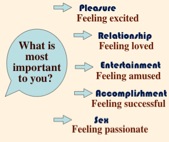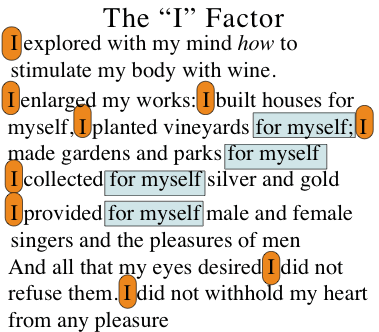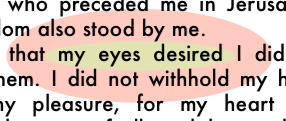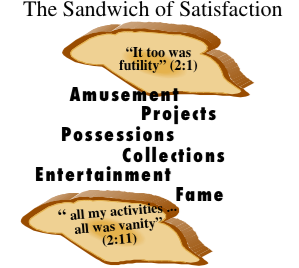

The Pursuit of Pleasure Ecclesiastes 2:1-11
The Pursuit of Pleasure
Ecclesiastes 2:1-11
A Teacher's Bible Commentary
Paul J. Bucknell
Ecclesiastes Outline | Design
Ecclesiastes 2:1-11: 'The Pursuit of Pleasure,' part 1 of 4 on a study of The Pursuit of Pleasure, helps outline what Solomon is saying in Ecclesiastes 2:1-11 applies to our lives and those around us. What are you pursuing in life?
What is Your Greatest Love?
From the very beginning of Job we are called to think about what a great person is like. What things are most important to him or her? It might not be a topic that we openly discuss with Pleasure? Relationships? Entertainment? Accomplishment? Sex?
 These are just a few of the things that people feel are important to their lives. When something becomes very important to them, they make it a priority and shape their lives around it. We cannot understand people or ourselves until we begin to understand what drives them and guides them in the decisions that they make in life. One man who worked a minimum wage job owed people money and kept borrowing from others, but thought his monthly hundred plus dollar cable television bill important enough to keep it. Why? What drove him to make such decisions? How could he be helped? We might not have this problem, but one will be most surprised to see that all of life runs a similar pattern.
These are just a few of the things that people feel are important to their lives. When something becomes very important to them, they make it a priority and shape their lives around it. We cannot understand people or ourselves until we begin to understand what drives them and guides them in the decisions that they make in life. One man who worked a minimum wage job owed people money and kept borrowing from others, but thought his monthly hundred plus dollar cable television bill important enough to keep it. Why? What drove him to make such decisions? How could he be helped? We might not have this problem, but one will be most surprised to see that all of life runs a similar pattern.
Those who seek pleasure have a belief that feeling excited is very important to life. Those that focus on relationships believe that feeling loved or belonging is essential to a happy life. Those who favor entertainment like the sense of amusement it gives them. Those who like accomplishing things like the pleasure of feeling successful. Those who focus on sex like the erotic feelings involved.
We can understand a lot about our lives if we simply look at those things that we spend our ‘free’ money and time on. These are the things that people chase after–their pursuits in life. But we must look beyond them. They provide good clues as to what is important, but they are not very helpful in solving problems or improving their lives. We need to ask a further question. Why are those things that we chase after important.
This is the question that begs to be asked when we begin to look into this passage of Ecclesiastes 2. What is Solomon really after, anyway? His open approach helps us all get a better picture of ourselves. After all, many of us never dare be so honest about our lives, especially out in public.
Let’s first read the passage and then return to this question. The question of why we do things is important for without understanding its answer we cannot better our lives. Many a Christian struggle with their Christian lives because they do not understand their deeper desires within them. Let's look at today's text.
“I said to myself, “Come now, I will test you with pleasure. So enjoy yourself.” And behold, it too was futility. I said of laughter, “It is madness,” and of pleasure, “What does it accomplish?” I explored with my mind how to stimulate my body with wine while my mind was guiding me wisely, and how to take hold of folly, until I could see what good there is for the sons of men to do under heaven the few years of their lives. I enlarged my works: I built houses for myself, I planted vineyards for myself; I made gardens and parks for myself, and I planted in them all kinds of fruit trees; I made ponds of water for myself from which to irrigate a forest of growing trees. I bought male and female slaves, and I had homeborn slaves.
Also I possessed flocks and herds larger than all who preceded me in Jerusalem. Also, I collected for myself silver and gold, and the treasure of kings and provinces. I provided for myself male and female singers and the pleasures of men--many concubines. Then I became great and increased more than all who preceded me in Jerusalem. My wisdom also stood by me. And all that my eyes desired I did not refuse them. I did not withhold my heart from any pleasure, for my heart was pleased because of all my labor and this was my reward for all my labor. Thus I considered all my activities which my hands had done and the labor which I had exerted, and behold all was vanity and striving after wind and there was no profit under the sun” (Ecclesiastes 2:1-11).
Why is it that when looking at this passage we are forced to look at why we do things? Allow me to reshape this text a bit and perhaps we can see this more easily.
When pleasure provides one’s needed meaning or
significance in life,
then one becomes dependent on
increasing amounts of pleasure.
But once that feeling with its associated pleasure came and was filled, it went away. It is interesting how God designed man. If the pleasure didn’t go away, we would surely end up killing ourselves by immediately repeating the act. After the short feeling of pleasure is satiated, guilt sets in. It is an awareness that one has broken God’s standard. This awareness gets less and less as one does it. People get more hardened and even convinced others are wrong to think it wrong. They even get upset with those associated with standards and God HiImself. Along with spiritual guilt, is a big emptiness, a void. Despair and depression often settles in. This makes the person even more willing to go through the cycle again. They don’t want that emptiness and the accusing guilt hanging over them. They rather make big plans for attending some party. They don’t want to think how they hurt or lied to someone.
Once a person gets into this trap, they easily fall into the rut of covering their emptiness with a distraction of pleasure. What makes this cycle so powerful is that it combines a whole complex of biological, sociological, emotional and spiritual patterns. We could say so much more. The most important is that being caught in a rut does not mean one is not a Christian, but if one stays in one, he betrays his true desires for evil and not good. If one repents, God will set a person free through the grace of Christ Jesus. Talk to me if you have a problem.
The “I” Factor
There are many ways that we seek for pleasure. Not all pleasure is wrong. But when it is sought in such a way that violates God’s revealed standards, then they become wrong. It is possible that Solomon bought out the property of others so that he could expand his own parks and private place. Even if he didn’t, many have. They were so focused on their desires to accomplish their project that they overstepped the boundaries. Remember how Queen Jezebel killed a man and chased off his widow in order to get his property and grapevines? This shows you how a goal can lead to many immoral decisions.
But there is another way to look at these things. It is easier to miss. Let’s look carefully again at the words Solomon wrote and see if we can catch the heart of this problem.
- I explored with my mind how to stimulate my body with wine.
- I enlarged my works: I built houses for myself, I planted vineyards for myself; I made gardens and parks for myself
- I collected for myself silver and gold
- I provided for myself male and female singers and the pleasures of men
- And all that my eyes desired I did not refuse them. I did not withhold my heart from any pleasure
- Then I became great and increased more than all.
- We notice right away two different but related things.
1) “I” – His preoccupation with self
 We first will notice how many “I” there are in this passage. His focus was on what he did. I did this or I did that. There is an innate desire to be known and recognized. We want people to think well of us. Part of this is our desire to be accepted but part of it is associated with our pride- we want to be the best. When we focus on what we did, then we compare ourselves and compete with others. We want to be best.
We first will notice how many “I” there are in this passage. His focus was on what he did. I did this or I did that. There is an innate desire to be known and recognized. We want people to think well of us. Part of this is our desire to be accepted but part of it is associated with our pride- we want to be the best. When we focus on what we did, then we compare ourselves and compete with others. We want to be best.
This is the ‘pride of life’ that John mentions. Esteeming what we decided to do and not to do. We even admire our decisions as to be the best decisions. When we focus on our own works, then we get to boast about how great we are.
There is the religious side of this too. Many people who call themselves Christians focus on how good they have been. That is their good works. They are smug in their good works. God hates this because our good works are just a whole system of pridefully examining our lives compared to others. We never compare it to what God wants. This is a religious person who has never found Jesus because he doesn’t think he needs Jesus. He is good enough. May God rescue you out of this pit of deception is this is where you are at.
We do not only see the number of “I”s in this passage but also the purpose for which he does them.
2) “For myself” –His purpose centered around his own life
We see the number of ‘my’ and ‘for myself.’ Again, we agree that it is not wrong to think about our needs and try to care for them. God made us this way. But when we do this with our whole life, we fall into a great mass delusion of living for ourselves.
God never made us to live for ourselves. All His gifts and life itself was never to live for our own selves. Humanists believe and die in that belief, but it simply fools a person to think that their greatest good is found when they live for themselves. Solomon found this out for himself and God wants to warn us not to enter into his folly. There is something much greater out there to live for. Only when we begin to live for the purpose God has made us, will everything begin to properly fall into place. God said He made us for Himself. When we focus on our own lives, then we resist and reject not only His ways but He Himself. We end up with dust alone.
 Jesus showed us how to live. He said, “The thief comes only to steal, and kill, and destroy; I came that they might have life, and might have it abundantly” (John 10:10). He Himself did not live for Himself but to do His Father’s will. His purpose was not to suit Himself. If it was, He would not have died on the cross for our sins. “Therefore be imitators of God, as beloved children; and walk in love, just as Christ also loved you, and gave Himself up for us, an offering and a sacrifice to God as a fragrant aroma” (Ephesians 5:1-2).
Jesus showed us how to live. He said, “The thief comes only to steal, and kill, and destroy; I came that they might have life, and might have it abundantly” (John 10:10). He Himself did not live for Himself but to do His Father’s will. His purpose was not to suit Himself. If it was, He would not have died on the cross for our sins. “Therefore be imitators of God, as beloved children; and walk in love, just as Christ also loved you, and gave Himself up for us, an offering and a sacrifice to God as a fragrant aroma” (Ephesians 5:1-2).
The apostle instructs us, ““Whatever you do, do your work heartily, as for the Lord rather than for men;” (Colossians 3:23). An outworking of this is how we as brothers and sisters in Christ live for each other as members of the body. We are not just doing what we like to do but doing what God would like us to do. As long as we live for ourselves, we mess up our lives and end up with much frustration and disappointment. Like Solomon, we will end up saying, “Thus I considered all my activities which my hands had done and the labor which I had exerted, and behold all was vanity and striving after wind and there was no profit under the sun” (Ecclesiastes 2:11).
Let’s take one more look at those things that Solomon involved himself. They are not very different than from our lives in some sense.
The Sandwich of Satisfaction
 This list looks more like a list of, “What would you do if you had the money?” Solomon is not telling us, however, what he would like to do but what he did do. But even more, like a modern blog, he tells us openly why he did these things. He tears his mask off his face and throws the pretend reasons down. He tells everyone that when it comes down to it, he was trying to seek fulfillment in his life by all these things. He was seeking the ‘good’ (literal word for pleasure in 2:1) of life thinking it would fulfill him. It didn’t. If you have any doubts as to whether he was thinking about such things just notice his preface and conclusion to this section. They form a sort of sandwich.
This list looks more like a list of, “What would you do if you had the money?” Solomon is not telling us, however, what he would like to do but what he did do. But even more, like a modern blog, he tells us openly why he did these things. He tears his mask off his face and throws the pretend reasons down. He tells everyone that when it comes down to it, he was trying to seek fulfillment in his life by all these things. He was seeking the ‘good’ (literal word for pleasure in 2:1) of life thinking it would fulfill him. It didn’t. If you have any doubts as to whether he was thinking about such things just notice his preface and conclusion to this section. They form a sort of sandwich.
He doesn’t get far into his thoughts before he gives us a shock treatment with the statement, “And behold, it too was futility” (2:1). If we missed his message, he ends the same way. “Thus I considered all my activities which my hands had done and the labor which I had exerted, and behold all was vanity and striving after wind and there was no profit under the sun” (2:11).
All these great things that we would like to put our life is stuffed into the vanity sandwich. There are a lot of people here who would not say that they have a problem with lust and drugs. But perhaps they are convinced that they can find meaning in life through other things. Let’s explore these other things.
Amusement (2:2)
Amusement are things that catch and keep our attention. A computer game or soap opera. A comedy. Music. They keep us distracted from our personal troubles or boredom. In the end, we might come to believe that our goal in life is to be kept amused.
Projects (2:4-6)
Solomon had a number of projects. Notice the ecological sound plans. He wrestled God’s creation into beauty and function. He made a pond so that it would water a group of trees.
Possessions (2:7)
Perhaps we are more aware of this strategy, the one of possessions. Most people believe they are what they own. They feel stripped if they do not have any possessions. In their mind is a belief that having is everything. They cannot believe that those who do not have can be happy. Solomon had slaves and flocks. He could say, “I possessed flocks and herds larger than all who preceded me in Jerusalem” (2:7)
Collections (2:8a)
The rich look for ways to impress and to store their wealth. Collections are a cool way to do both at the same time. Whether it be books, art pieces, cars, etc., all are there to show off. They do not need them. Solomon collected, silver, gold and treasures from around the world. He showed them off.
Entertainment (2:8b)
Entertainment has become a pleasure for everyone. It used to be only for the rich and upper class. Solomon had to provide the entertainment for himself. In this case, he got male and female singers. He developed his own personal theater.
Fame (2:9)
Solomon looked to be known by others. “I became great and increased more than all who preceded me.” Some people want to be recognized as others by great. They think if others think great of me, that I will feel important. But Solomon recognized it was all a sham, unfortunately he didn’t realize this until it was too late.
As he looked back in life, he could see all of these things as mere searches for pleasure or satisfaction. If any of the things satisfied them, he would not need to go on to other searches. But they all failed him. They would fail us too. Just the number of things he embarked on seem to be a clear enough testimony of this, but again it is his conclusion. All is vanity.
In particular, he named his activities as vanity. Perhaps, you feel a bit uncomfortable here thinking that he is being overcritical. But we must accept his words for their face value. He saw them as empty. All was striving after wind. It didn’t matter if in verse 9 he could say, “Then I became great and increased more than all who preceded me in Jerusalem.” Trying to find deep satisfaction will never come from what we have or our projects.
Can you recognize this? Many of you are young, and you are quite willing to think these things will fulfill you. God created this ancient blog and showed it to us so that we could get a better perspective on life. The summary is one that is hard to stomach, especially if you are focused on getting the most in your life. You might think of all the things that you are involved in or the plans you have for life. This is the reason I have asked you to think through not only what you are doing, but why you are doing it. This is why Solomon revealed his own heart’s intentions. He saw that when he got honest with himself, that he was trying to find delight in all his projects and the tantalizing of his body. If this was his goal, none of these things could help. Still down deep, he had this quest for something greater.
Some people serve in the church to find that ultimate sense of meaning. Some get married. Others have children. Others send their children to the best colleges. Even in these things, though they be good, one will not find it. Actually, many people do not know 1) that they are seeking some ultimate meaning in life and 2) where that ultimate satisfaction of life comes from. Let’s think about this a bit before closing.
Under the Sun & Above the Sun
Solomon’s summary concludes that “there is no profit under the sun.” We could rephrase that and simply say that none of these things brought about the real desired effect that he hoped. What did he want? Why did he want those things? Why didn’t he find it? I can imagine many people would like to trade places with him. But there was a better way, otherwise there is no reason to take away the hope of the young.
The hope comes from ‘above the sun.’ If we live for ourselves, we live without respect to what God might want for our lives. Just because one is religious, it does not mean that they live for God. Not at all. People use religion for their own purposes too.
 Let me give an illustration. Say that the sum total of all our activities are represented by what can fit in a container like this barrel. It represents our life as we know it. We try to maximize our lives so that we get the most out of our lives. We are busy buying clothes that impress, get the best jobs with the best pay, marry someone from a good class, send our children to the best schools, etc. We are focused on as Solomon says many a time, “life under the sun.” We strive hard to have a good life, however we interpret that. We do our best with what we have. We congratulate those who best achieve what we think should be achieved and look down on those who do not.
Let me give an illustration. Say that the sum total of all our activities are represented by what can fit in a container like this barrel. It represents our life as we know it. We try to maximize our lives so that we get the most out of our lives. We are busy buying clothes that impress, get the best jobs with the best pay, marry someone from a good class, send our children to the best schools, etc. We are focused on as Solomon says many a time, “life under the sun.” We strive hard to have a good life, however we interpret that. We do our best with what we have. We congratulate those who best achieve what we think should be achieved and look down on those who do not.
Solomon did more than any of us could do. He had his barrel too. But let our lives past and time go on. Do those things mean anything? In other words, he asks us, “So what?” When things are vain it means that they are not worth anything. So what does it really matter what you did in the end when you are long gone? Did you ever go by the cemetery and wonder, “So what?” about their lives? What does it matter? You struggled so hard to get to that best college or get that position. But who remembers you? What difference does it make that you were rich or poor? All these achievements are empty if we look at things as he did from under the sun.
This is the secular viewpoint. All that exists is what we can see. It is very sad. But there is something in us that drives us to seek meaning. What is that? It is a reflection of God’s image in our lives. The real world is more than what we can see. Our little barrel of life is actually a part of a larger system. In fact, our life is like a barrel on a truck being transported into God’s presence. We all are ultimately accountable to Him.
The ultimate questions of life will never find their meaning in what we do for ourselves on earth but on what we have done for Him our Maker. One day our barrel will be opened up and all our actions, thoughts, decisions, projects will be evaluated. He will not ask us if we were a good husband. He will look at our lives and see whether we actually loved our wives. At that point, all our formerly hidden motives will be revealed.
The reason that our pursuits of pleasure and satisfaction do not really bring joy is that we have been serving ourselves. God made us to serve Him and others, and it is only when we live along with His design do we find fulfillment and joy. ““These things I have spoken to you, that My joy may be in you, and that your joy may be made full” (John 15:11).
Conclusion: What does it mean to worship God?
The real pleasures that God has stored up for us are found in living for Him. Real meaning in life come about when we stop focusing on pleasing ourselves and start living for Him and others. All of a sudden, this one person, becomes the divine hand of God. God brings His love into the world through the body of Christ, His people.
We need to get to the motivation of our decisions. Why are we studying? Why are we leading worship? Why are we raising our children? Why do we drive the way we do? If a person lives for himself, then he will, as we have seen, boast in what he himself did and live for his own good. Whenever a person fixates himself on his own pleasures. he brings much trouble to his life, health and relationships not to mention the eternal consequences of life without God’s life.
Let’s get back to the topic of pleasure. What pleases you the most? What is it that you really live for? Is it a raise? Is it someone to praise you? Is it to have a nice house that people admire? Or some special thing you have done?
 God wants us to have happy and joyful lives. Jesus again and again speaks about this joy. He knew the many great things that He did but got the most pleasure not in their meaning to Him but in the way He pleased His Father in heaven. Worship is honorable only when we are able to do all for His glory. Motivation counts. We can do normal things like have a vacation, but its purpose is transformed. Remember that time Jesus went off by Himself with His disciples? The people followed Him and once Jesus saw them he had compassion on them. Do all to the glory of God. When we seek to glorify Him in everything that we do, we change our focus to Him, and amazing changes take place. Let’s close by briefly looking at a few examples.
God wants us to have happy and joyful lives. Jesus again and again speaks about this joy. He knew the many great things that He did but got the most pleasure not in their meaning to Him but in the way He pleased His Father in heaven. Worship is honorable only when we are able to do all for His glory. Motivation counts. We can do normal things like have a vacation, but its purpose is transformed. Remember that time Jesus went off by Himself with His disciples? The people followed Him and once Jesus saw them he had compassion on them. Do all to the glory of God. When we seek to glorify Him in everything that we do, we change our focus to Him, and amazing changes take place. Let’s close by briefly looking at a few examples.
Giving thanks for our food. When we thank Him, we truly thank Him for the meal. He cared for us, and we are touched. We are not just focused on pleasing our senses, but transport the whole meal to eating in His presence. We recognize His grace to us. .
Next -> Cycle of Satisfaction









